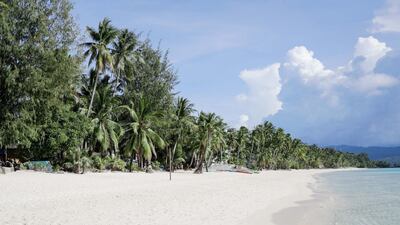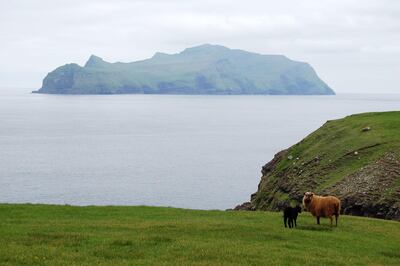Going somewhere special in 2019? According to statistics website The World Counts, there will be one billion tourist arrivals around the world this year. That’s 30 every second. Next year, that number is set to increase by 60 per cent as we expand our travel horizons. And while this is good for the world economy, it doesn’t exactly bode well for the planet.
Reports of destinations closing their doors to visitors to prevent further damage from the onslaught of tourism have become increasingly common. From Maya Beach on the Thai island of Koh Phi Phi Leh, made famous by Leonardo DiCaprio's The Beach, to Boracay island in the Philippines, over-tourism is beginning to ravage the fragile ecosystems of some of the planet's most idyllic spots.
That's without mentioning the pollution and carbon footprint that is a consequence of every flight we take to these far-flung corners of the world. Tourism now contributes five per cent of global greenhouse gas emissions – most of which is attributable to the transport that gets us from home to holiday.
"Tourism puts enormous stress on local land use, and can lead to soil erosion, increased pollution, natural habitat loss and more pressure on endangered species. These effects can gradually destroy the environmental resources on which tourism itself depends," is the dire warning issued by The World Counts, which aggregates data from relevant organisations, research institutions and news services to create live statistics on the state of the world.
Tourists, it seems, are beginning to heed these warnings. ABTA's Travel Trends Report 2019 states that the number of travellers taking a company's sustainability credentials into account has increased from 24 per cent to 45 per cent in the past five years. This may be why so many hotels, tour operators and even countries are beginning to make decisions that are not based solely on profit, but also take the good of the planet into account. "Seventy per cent of tourism growth over the next 10 years will go to 20 countries, and even within those countries, specific places will benefit more than others," says Olivia Ruggles-Brise, director of strategy at the World Travel and Tourism Council.
"For future tourism growth to be sustainable, there needs to be a concerted effort by all concerned to plan effectively, and part of that is the dispersal of tourism activity away from honeypot areas."
While Ruggles-Brise suggests that tourists steer clear of over-crowded destinations, and travel during off-peak periods and for a "decent" period of time, some nations are choosing to restrict travel to specific spots altogether, opting instead to give the environment time to recover.
In light of tourism to the Faroe Islands increasing by 10 per cent each year over the past five years, the Nordic archipelago will close for maintenance for a few days next month. Between April 26 and 28, the nation will not allow visitors to its 18 islands unless they are willing to help locals maintain them. The islands will accept 100 volunteers who will join the Faroese crew tasked with helping preserve one of the world's most unspoilt places.
Meanwhile companies such as Responsible Travel guide tourists to destinations that will benefit from their visit, encouraging "low-carbon adventure holidays and holidays that engage with local communities and support them financially, so that they have viable alternatives to unethical ways of living".
On a global scale, Slovenia was recognised as one of the most sustainable countries in the world by the 2018 Sustainable Destinations Top 100 list, with Bled, Ljubljana, Komen, Podcetrtek and Rogaska Slatina heralded for making sure tourism actually benefits local communities. The past five years have seen Ljubljana ban cars from its centre, focus on environmentally friendly construction and increase its green public spaces.
Costa Rica also made it on to the list – unsurprising given its recent commitment to eliminating single-use plastics from the country by 2021 and its developments in reforestation, which have seen the country double its forest cover since the 1980s. While the Costa Rican Tourism Board has created a certification programme to define and proliferate eco-friendly practises in the nation's hotels, 30 per cent of the country itself is protected as a national park, offering tourists the opportunity to contribute to wildlife conservation.
When it comes to hotels and resorts, companies such as Book Different rate accommodation based on sustainability credentials. "Book Different was established because we realised that the tourism industry was offering too much of everything. This sector has grown at an incredible pace and expectations for its growth rate are enormous for the coming years," says Lonneke de Kort, chief executive of Book Different.
The company, which won the Sustainable Travel Award run by the Dutch Association of Travel Agents for its contribution to making travel greener, allows tourists to book a hotel or apartment based on its sustainability rating. "If you want to be certain of the sustainability [of your choice], always book certified hotels or hotels with the staygreencheck icon at www.bookdifferent.com. The more hearts in the staygreencheck, the better they perform," says De Kort.
You can choose between options such as the world's first vegan hotel suite, designed by multisensory design company Bompas & Parr for the Hilton London Bankside in UK capital, or a stay with Lagom, a company offering ski chalets in Switzerland that allow guests to save money on their trip according to how eco-friendly they choose to make it. You can strip your trip of little luxuries such as a daily clean, bathrobes, extra towels and toiletries, saving on CO2 emissions, as well as on the cost of your holiday. And if you're looking for the ultimate resort to stay in for sustainable travel, head to Abu Dhabi's Sir Bani Yas Island, crowned World's Leading Sustainable Tourism Destination by the World Travel Awards for five consecutive years since 2014.
Beyond accommodation, tour providers are also looking to counter the negative effects their businesses might have on the places they take people to. The Yacht Week, which offers yachting tours around the British Virgin Islands and selected destinations in Europe, has launched Revive Week – a one-week mission around the Greek islands involving 100 volunteers who clean up the beaches of the Saronic Gulf. The project will also assist in the funding of the Saronic Gulf's first Marine Litter Collection Station.
Airlines are also encouraging customers to take a conscious note of their carbon emissions and do something about it. While the greenhouse gases omitted by air travel seem inescapable in our modern world, many airlines are now allowing customers to offset their own carbon footprint by paying a little extra to cover the cost of developing aircraft that are more efficient, or to develop other initiatives such as waste minimisation.
Look to airlines such as Gulf Air, United Airlines, Delta, British Airways, Emirates, Qantas, Virgin Australia, Air New Zealand and Air Canada, which will provide the option of giving back what you might have taken from the environment. Time to book differently? We think so.




